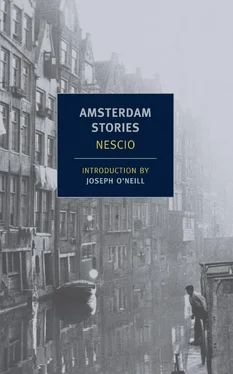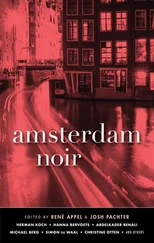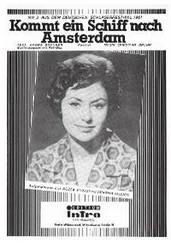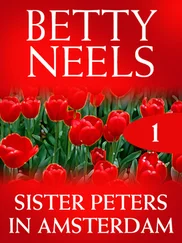And then, with a few variations, he repeated his old reverie about the water, how it flowed eternally to the west, out toward the sun every night. In Nijmegen there was a doctor who had taken the same walk at the same time every morning for fifty-three years — over the Valkhof hill and down the north side and up the Waalkade to the railroad bridge. That’s more than 19,300 times. And always the water flowed to the west. And it didn’t mean a thing. It must have flowed like that for a hundred times fifty-three years. Longer. Now there’s a bridge over it. Since just a short time ago, a few years. Which is still a long time. Every year is 365 days; ten years is 3,650 sunrises. Every day is 24 hours, and every hour more goes through the heads of all those constantly worrying people than you could set down in a thousand books. Thousands of worriers who saw that bridge are dead now. And still, it’s only been there a short time. The water there has been flowing for much, much longer. And there was a time when the water didn’t flow there. That time was even longer, much longer. The worriers have died by the hundreds and hundreds of millions. Who remembers them now? And how many more are going to die after them? They just worry away until God gathers them up. And you’d think God was doing them a favor when he suddenly wiped them away. But God knows better than you or me. All they want to do is fret, and struggle, and keep on struggling. And meanwhile the sun rises, the sun sets, the river there flows to the west and keeps flowing until that too will come to an end.
No, he had no more plans and he wasn’t planning to let it get to him anymore either. He would make sure not to do that. He did accept an invitation to dinner that night, and even sang a funny song and gave a crazy speech standing on a chair.
Japi stared for a few months more. He was not in the best of health and the sick benefits from his office had run out. He spent the winter in Amsterdam, where everyone was busy tearing down beautiful houses to replace them with hideous ones, worrying the whole time.
In May he moved to Nijmegen.
He wrote me a postcard from there to say that Jeanne had died of her lung ailment. He had been waiting for that, he wrote.
At half past four one summer morning, during a majestic sunrise, he stepped off the bridge over the Waal. The watchman saw him too late. “Don’t worry, old boy,” Japi had said, then he stepped off the bridge, his face to the northeast. You couldn’t call it a jump, the watchman said, he stepped off.
They found a walking stick in his room that had belonged to Bavink, and six notes on the wall saying “Dammit” and one with “All right then.”
The river has kept flowing west since then and people have kept on worrying. The sun still rises too, and Japi’s parents still get their Daily News every evening.
His trip to Friesland remains a mystery to this day.
1909–1910
I
WE WERE kids — but good kids. If I may say so myself. We’re much smarter now, so smart it’s pathetic. Except for Bavink, who went crazy. Was there anything we didn’t want to set to rights? We would show them how it should be. “We”: that meant the five of us. Everyone else was “them,” the ones who didn’t see it, didn’t get it. “What?” Bavink said. “God? You want to talk about God? Their pot roast is their God.” Other than a few “decent fellows” we despised everyone — and secretly, I still think we were right. But I can’t say that out loud to anyone now. I’m not a hero anymore. You never know who you might need later. Hoyer also thinks you shouldn’t offend anyone. No one ever sees or hears from Bekker anymore. And Kees Ploeger talks about the good-for-nothings who led him down the wrong path. But back then, in our crazy days, we were God’s chosen ones, we were God himself. Now we’re sensible, again except for Bavink, and we look at each other and smile and I say to Hoyer, “What did it all get us?” But Hoyer doesn’t see it that way, he’s a lost cause, he’s turning into one of the bigwigs of the Social Democratic Workers’ Party and all he does is raise his hands in doubt and shrug.
We were never clear about what we were going to do exactly, but we were going to do something . Bekker had some vague idea about blowing up all the offices, Ploeger wanted to make his boss pack his own clocks and then stand there watching him with a cigar in his mouth, cursing at people who can never do anything right. We were unanimous that we had to “get out.” Out of what, and how? The truth is we did nothing but talk, smoke, drink, and read books. And Bavink went out with Lien. Looking back, I think we were a magnificent bunch of young men, we deserved a fortune but despised “having lots of money”; Hoyer’s the only one who started to think a bit differently about that before long. Bavink didn’t understand why some people could ride in carriages whenever they wanted and wear expensive coats and order other people around who weren’t any dumber than they were. You didn’t see many automobiles yet in those days.
We spent whole summer nights leaning against the fence around Oosterpark and talking and talking. We could have earned enough for a whole living-room set if only we’d kept track of it all. People write so much nowadays.
A lot of the time we were less talkative. We sat on the curb until long past midnight, right on the street, and were melancholy and stared at the bricks and then up from the bricks at the stars. Then Bekker said that actually he felt sorry for his boss, and I tried to write a poem, and Hoyer said he had to stand up because the cold from the blue limestone curb was seeping into him. And when, in that short, balmy night, the darkness turned pale above our heads, Bavink sat with his head in his hands and spoke of the sun, almost sentimentally. And we thought it was a shame to have to go to bed, people should be able to stay up forever. That was one of the things we’d change. Kees was asleep.
And then we were off to the Zuiderzee to watch the sun come up, except for Kees, who went home. Hoyer complained about the cold but Bavink and Bekker didn’t notice it at all. They sat on the stones down on the dike with eyes half closed and looked through their eyelashes at the little arrows of dancing gold that the sun made in the water. The sight made Bavink go mad; he wanted to run across the long, long, glittering stripe all the way to the sun. But he stopped at the water’s edge after all and stood there. I remember one day when we, Bavink and I, went to the seaside and half the sun lay big and cold and red on the horizon. Bavink hit his forehead with his fist and said, “God, God, I’ll never paint that. I’ll never be able to paint that.” Now he’s in a mental hospital. When we came back from the Zuiderzee we couldn’t see anything except yellow spots for a long time and our bosses didn’t like these excursions of ours at all. I was half asleep at the office afterwards and Bekker, who could handle it better than I could, sat at his desk daydreaming about the sun all day and looked out at the lit-up treetops on the far side of the garden more than usual and longed for six o’clock more desperately than ever.
We were also big on excursions after work to the ring of dikes around the city. We sat in the grass down on the dike, among the buttercups, and inquisitive cows came up to us with their big eyes and looked at us and we looked at them. And then it was a sure bet that Bavink would start in about Lien. One way or another those cow eyes must have had something to do with it. And then the twilight started to shimmer, the frogs started croaking, one frog made a horrible racket right next to my shoe, my foot was almost in the ditch. You could hear other frogs softly, far, so far away. The cow that in the half dark you could hardly see anymore you could still hear, trimming the grass. One started mooing pitifully in the distance. A horse ran back and forth, you could hear it but not see it. The cow near us snorted and started to get restless. Bekker said: “It’s nice here. If only it stayed like this.” Bavink stood up and spread his arms wide and listened, and then sat down again and said that we didn’t get it either, and we never would, he himself didn’t get it, and really we were not much better than everyone else, and I think he was very nearly right about that.
Читать дальше



![Олеся Проглядова - Nomen nescio. Имя неизвестно [litres]](/books/391740/olesya-proglyadova-nomen-nescio-imya-neizvestno-lit-thumb.webp)








